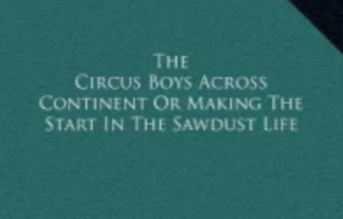CHAPTER XX — The Circus Boys Across the Continent
byCHAPTER XX — The Circus Boys Across the Continent takes a sharp turn as Phil Forrest wakes up alone and bewildered, lying on a patch of grass near a railway siding in Mexico, Missouri. His body aches, his mind scrambles to recall how he arrived there, and he quickly realizes his pockets are empty—his money and watch missing. Locals, spotting him near the freight train, immediately accuse him of being a stowaway, adding insult to injury as he struggles to explain the truth: he had been attacked, robbed, and locked inside the car during the previous night.
Phil tries to clarify his situation, but his story is met with suspicion. Explaining his role in the Sparling Combined Shows and his need to return, he appeals for help. The townspeople remain doubtful, clearly unaccustomed to circus folk, but one of them eventually proposes a test to verify Phil’s claims—if he really belongs in the circus, he should be able to prove it.
With few options and even fewer allies, Phil agrees, despite it being Sunday and the setting hardly ideal for a performance. The townsfolk lead him to a local farm, where they expect a demonstration of bareback riding. To Phil’s surprise, his “performance horse” is a towering Percheron named Joe, a working draft horse unfit for circus tricks. Rather than reject the challenge, Phil maintains his composure, treating the situation like a spontaneous act under the big top.
Using powdered chalk to prepare the horse and his own hands and feet, he begins turning the rustic barnyard into a stage. His movements reflect precision and control, echoing routines once practiced under canvas and lights. Children gather, their curiosity turning into awe as Phil balances, spins, and swings on the wide back of the draft horse, transforming skepticism into applause with each improvised stunt.
His willingness to perform under such unglamorous conditions wins the crowd’s admiration. The townspeople begin to believe his story, not because he convinces them with words, but because of the skill and spirit in his actions. One farmer, impressed by Phil’s grace and honesty, offers a meal and a little money to help him start his return journey.
Phil’s determination to return to the circus isn’t just about survival—it’s about belonging. The circus isn’t merely a place of work for him; it’s his family, his purpose, and his passion. Even when stripped of everything familiar, he upholds the spirit of the ring, showing that true performers carry their stage within them, no matter where they land.
While still far from his intended destination, Phil’s courage and initiative spark a ripple of goodwill in the town. A kind stranger agrees to drive him partway by wagon, closing some of the distance he needs to cover. The rest, he decides, can be done on foot or with further help, as long as he keeps moving forward.
His ability to turn a bleak situation into an opportunity reflects a broader truth about circus life—it’s unpredictable, physically demanding, and often misunderstood. Yet within that uncertainty lies the essence of what makes circus performers resilient: a drive to press on, entertain, and maintain poise, even in unlikely places. Phil may have been separated from the troupe, but his heart never left the ring.
As he travels back, Phil considers how easily he could have given up. But each step taken, each mile reclaimed, becomes a silent act of defiance against the fear and exhaustion that once tried to break him. By the time the chapter closes, Phil’s journey feels less like a detour and more like a rite of passage—proving not just to others, but to himself, that courage isn’t found under the spotlight, but in the moments you keep walking toward it, no matter how dark the road becomes.

